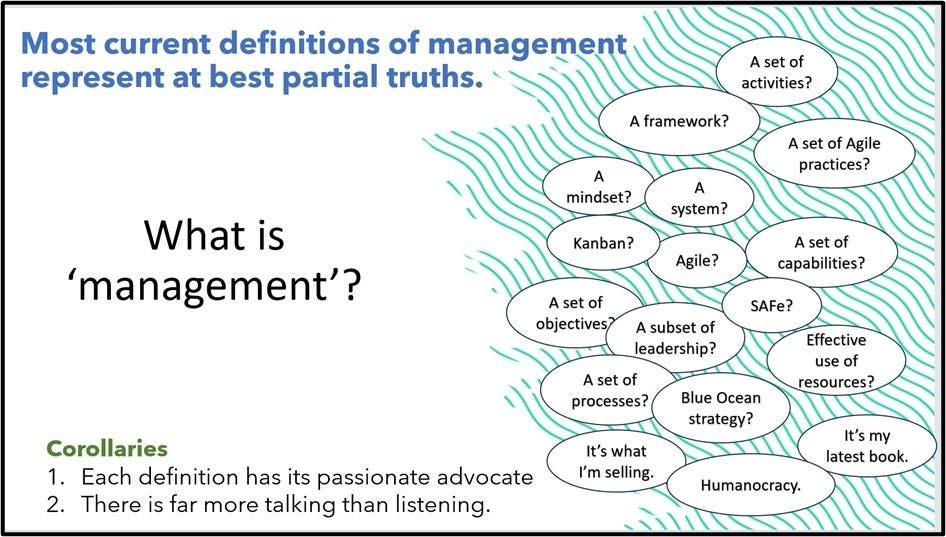A salient fact about management is the lack of clarity as to what it is. The monumental quantity of writing on the topic is vitiated by the lack of agreement as to what is being discussed. The conflict between differing definitions of ‘management’ risks turning management into a Tower of Babel.
And this isn’t just an academic spat. When business schools train some 250,000 future leaders in management annually, the lack of clarity as to what they teach has become a significant social issue. What is taught in business schools leads in due course to the actual managerial practices of large corporations, which in turn cause disengagement of the workforce, the decline in innovation, the loss of public trust in corporations, and the failure of organizations to achieve their potential to address global challenges like climate change.
Conflicting Definitions Of Management
Thus, is management a set of activities? Or the administration of resources? Or a science for achieving efficiency, or of making money, or creating value for shareholders, or customers, or all the stakeholders? Or the application of dynamic capabilities? Or decisions informed by the best available evidence? A set of processes? Or a set of mindsets? Or maybe a subset of leadership? Or is leadership a subset of management? Or is management coping with competition? Or the enabling of innovation? Or is it a set of arrangements characterized by self-management, wholeness, and a deeper sense of purpose? Does management inherently require command-and-control? Or is this one option among others?
Each definition of management has its proponents. Each definition arguably adds to our understanding of management. Yet all fall short of offering a coherent picture of how the subject of management fits together as a whole. As a result, management has yet to become a coherent intellectual discipline.
The Lack Of Definitional Clarity Is Not Seen As A Problem
Yet another curious fact about management is how few management practitioners or analysts see this lack of clarity as a significant issue. Even prominent books purporting to tell hard truths about management offer no definition, apparently assuming that the meaning of the term is self-evident.
To the extent that analysts or practitioners address the issue at all, they usually assume, or argue for, their own concept of management as the obvious and only possible, meaning of ‘management.’
Issues With Current Definitions Of Management
The principal issues with current definitions of management include:
1. Partial vs Comprehensive: Definitions in use often cover only parts of the phenomenon of management. Some focus on the objectively observable processes, tools, practices, systems, and structure. Other definitions focus on the subjective mindsets, assumptions, attitudes, aspirations, tacit knowledge, and organizational culture, that have played a key role in the digital-age organizations. Some definitions focus on the skills or capabilities.
2. Static vs Dynamic: Current definitions often fail to include the interactions among the components of management, particularly the interaction between mindsets and processes. Thus, initially, subjective mindsets drive the choice of processes to be adopted. But as processes become embedded in the organization, they can acquire a life of their own as part of the unstated culture of the firm, thus hindering change, even when many within the organization can see the need for change.
3. Complicated vs Complex: Some definitions treat organizations as complicated phenomena amenable to cause-and-effect interventions, rather than what they are: complex adaptive systems that respond in unpredictable ways to efforts to induce change.
4. Management vs Patterns of Management: There is a widespread Failure to distinguish between the definition of management as a discipline from the particular management patterns that may occur at different times and places. While the discipline of management should in principle be stable, the patterns of management that are in operation, or that may be recommended, may differ in different times and places.
5. Description vs Prescription: Some definitions of management fail to distinguish between descriptions of management currently being practiced and prescriptions as to how management should be practiced. In some cases, command-and-control is written into the definition of management. For instance, some definitions of management often imply that “command-and-control” management is part of the very definition of management, not merely one pattern of management among several.
6. The Role Of Innovation and Entrepreneurship: In some definitions, the role of innovation and entrepreneurship is treated as peripheral, thus ignoring the phenomenon that today’s most successful firms, such as Apple, Microsoft, Amazon, Tesla, and Nvidia, where innovation and entrepreneurship are driving forces in the whole firm.
7. Leadership vs Management: The movement begun by Abraham Zaleznik in 1977 to view management as a subset of leadership and to consider leaders as a different breed of people, led to the denigration of management and managers. The resulting is a two-class structure, analogous to the fictitious TV series, Downton Abbey. Leaders were now heroes, while managers became Dilbert-style caricatures.
8. Clarity vs Silence Over Organizational Goals: At the beginning of the 20th century, the French scholar, Henri Fayol articulated the role of a manager as an administrator in a bureaucracy. The function of a manager was to plan, organize, administer, and control the operations of a firm. The goal of the firm was implicitly to make money for the firm. Many discussions of management continue this tradition, sidestepping the furious debate over the last half century as to whether the purpose of a business is to maximize shareholder value or create value for customers and other stakeholders.
Nowhere are these issues more evident than what is taught in business schools, as can be seen in the textbooks in use, to be discussed in Part 2 of this article, coming here shortly.
And read also:
Re-Imagining The Very Concept Of Management
Why The Digital Age Integrates Leadership And Management
Read the full article here










